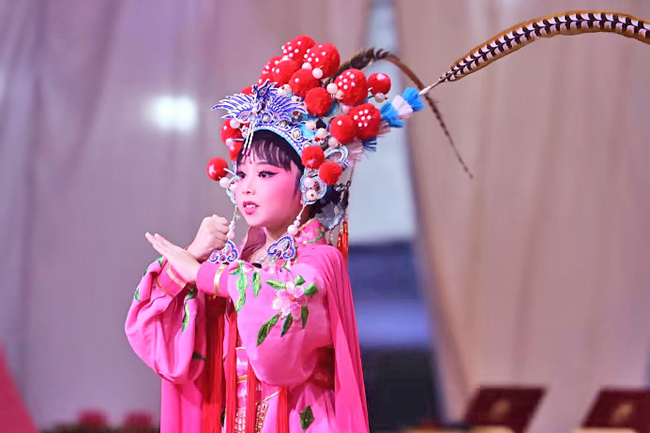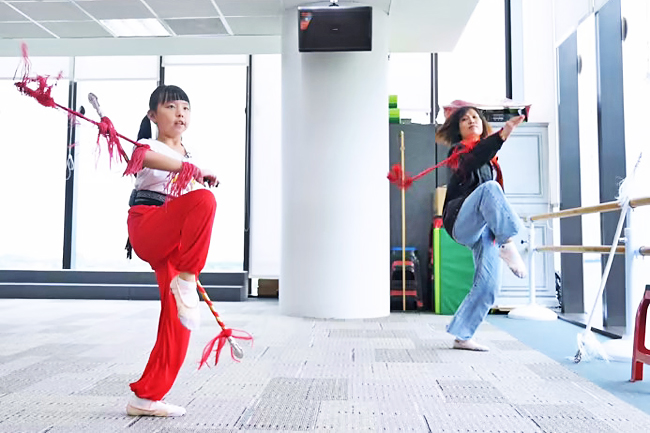Joyce Yang
CNA – Like many other little girls, Sophie Ng started attending dance classes at the age of three. Except she alternated between two outfits: One consisting of leotards and pointe shoes for ballet, and the other with elaborate headdresses and a full face of makeup for Teochew opera.
“I gave up on (ballet) because I find that Teochew opera is more interesting. Ballet, a lot of people did it. But for Teochew opera, only a few people did it,” she shared.
Sophie, now nine years old, is completely dedicated to her craft.
She trains for two hours every weekend and on several weekdays when there’s a performance around the corner.
Last year, prioritising practice meant sacrificing the June holidays, but Sophie considers it a worthwhile trade.
“When I get to perform on stage, I feel very happy when the audience applauds for me. And I get to wear all the beautiful makeup and costumes.”
In fact, it was the costumes and makeup that initially attracted Sophie to the traditional art form.


It all started when her mother, Joycelyn Phang, noticed how much she loved to perform and how well she recited rhymes in Teochew. “I didn’t really plan for Sophie to pick up Teochew opera because it’s something that’s really niche.
“Even for myself, as a Teochew, I’m also not familiar with the arts. But I thought, why not? She likes to perform. Maybe we can try, and she can just attend one lesson.”
But one lesson was all it took to ignite a spark, and Sophie was among the eight children in Nam Hwa Opera’s pioneer batch in 2017.
The Teochew opera academy in the Singapore Chinese Cultural Centre had become her second home in the last six years, but she remembers her first visit like it was yesterday.
“I was like, oh my god! There were these amazing costumes and makeup. When I first tried Teochew opera out, I thought wow, this is really interesting.
“I had never done anything like this before, so I told mummy I wanted to continue.”
“IT WAS A NEW LANGUAGE FOR ME TO LEARN”
In the studio, Sophie is her instructor’s shadow despite being half her height. With a horse whip in one hand and a sword in the other, Sophie mirrors her instructor’s every move, arching her back and quickening her pace on command.
A series of crescendos and diminuendos concludes as she wipes an imaginary tear off her face. Here, she portrays the legendary folk heroine Mulan. A Teochew opera artiste needs to be well-versed in martial arts, acrobatics, acting and singing.
Sophie’s vocal prowess belies her small stature, but the real show-stopper, for me, was her delivery in Teochew, which she had painstakingly perfected through rote memorisation since the age of three.
“When I first started, it was a little bit difficult. I don’t usually speak Teochew, and it was a new language for me to learn.
“The teacher would give us the script, and I would write the pinyin down. When I went home, I would memorise the lines.”
At three and a half years old, Sophie performed for the first time in the Teochew opera classic, Tao Hua Crosses The River.
As if going onstage before a live audience wasn’t daunting enough for a young child, she had to sing, act and dance – the whole nine yards.
“It took me half a month to memorise the lines for a four-minute show. When I was first on stage, I was really nervous because I thought I would do something wrong. But I did really well, actually,” she said.
Her longest performance to date? A 30-minute show that took nearly half a year to master.
LIFE LESSONS FROM TEOCHEW OPERA
When Sophie started out, all the props were bigger than her. But just as stage fright dissipated with one performance after another, Sophie also grew accustomed to the challenges of being a young Teochew opera artiste.
“When I first put the headdress on, I was like, oh my god! It’s so heavy! But after a while, I got used to it. I don’t feel like it’s heavy anymore.”
The headdress, in all its ornate glory, takes about 30 minutes to fit before a performance (costumes and makeup take another 40 minutes).
Not all children are accustomed to this rigour, and according to Nam Hwa Opera Deputy Director Annie Tan, some of them experience headaches and even vomit at the beginning.
“But they persevere in spite of that and insist on performing nevertheless,” she said.
“Children who learn traditional art are very self-disciplined. Performing as a group requires a high level of discipline.
“You can’t act on your individual whim and fancy. Everyone follows the teacher’s cues.”
Teochew opera, Annie said, has also helped many children overcome shyness.
“Some students could barely converse with adults at length when they started out, but are now confident enough to hold their own in media interviews.
“Because of Teochew opera, in school, I always speak confidently. During my oral exams for English and Chinese, I always get full marks,” she beamed.
At home, Sophie’s repertoire of Teochew opera pieces has also brought her closer to her grandparents, bridging the generation gap in its own way. Family gatherings inevitably lead to a “song request” or two, and rapport with her elders is instantly built.
“My dad is Teochew, and he’s very proud of Sophie,” said Joycelyn. “It’s something that he can brag about to relatives, that his granddaughter is a Teochew opera singer.”
TEOCHEW OPERA AS A VOCATION
Asked about her ambitions, Sophie quipped that she wants to be an artist, a performer, a singer or even a police woman when she grows up.
“I want to continue Teochew opera in the future because I want to travel around the countries and perform for other people. And I may receive a scholarship from Nam Hwa.”
“Apart from the scholarship, some may consider Teochew opera to be irrelevant to one’s academic trajectory in Singapore.
In our “tuition nation”, it’s tempting for parents to view enrichment classes and other co-curricular activities as investments with a higher return, boosting a child’s chances of securing a place in their dream school.
Surprisingly, the enrolment numbers at Nam Hwa Opera have steadily climbed over the past few years.
Its clientele is surprisingly diverse, comprising children from both local and immigrant families, Mandarin- and English-speaking alike. Are parents increasingly open to the road less travelled?
“I think the kids must have an interest in what they’re learning. With interest, they will somehow persevere even though the training is actually very tough,” said Joycelyn.
“For parents whose children have niche interests, what’s really important is to give them whatever support they need… Let them naturally take it up and take it in stride. Don’t force them.”
When asked for a word of advice to children who may be intrigued by Teochew opera, Sophie begins with a word of caution, warning them about the various skills required and the long hours of practice it entails.
She then offers a wise and simple conclusion:
“You just have to practise a lot, and then you’ll know how to do it already. That’s how I learnt to do this.”




